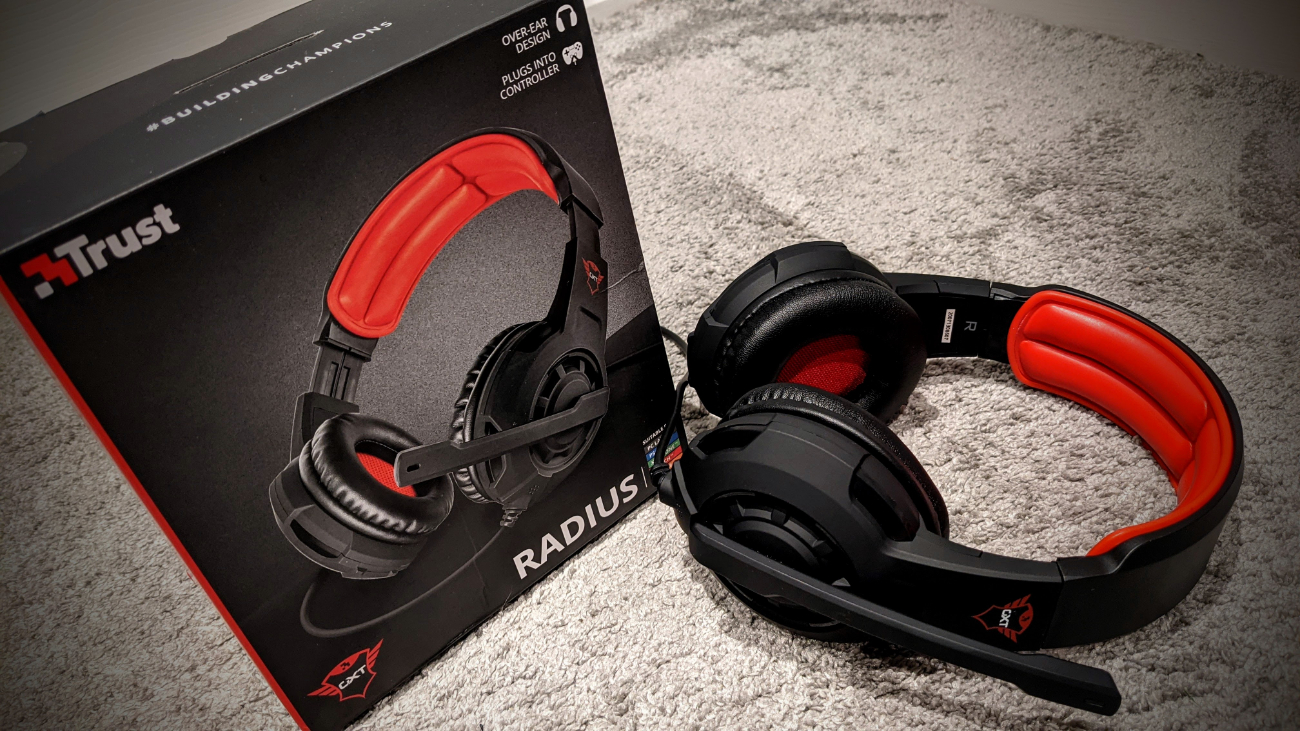For many, gaming accessories, and headsets in particular, get a bad rap. Yet whilst recent years have seen the gaming industry boom, it’s meant that all manner of third party accessories and headsets have hit the market. Many of these hit the spot required, and you’d struggle to find me dissing the likes of Razer, Steelseries or even PDP for the options they’ve brought to market. But away from those relatively large names are smaller companies who are trying to get a piece of the pie, their selling point being to go as cheap as possible. That’s where Trust come in, and with their GXT 310 Radius Gaming Headset they are certainly scraping the dregs of the barrel. I mean, a multi-format gaming headset for less than £20. Surely it can’t be any good?

Well, in case you’re short on time. You’re right. It’s not good and, honestly, you shouldn’t be buying it.
From the off the Trust GXT 310 Radius is the most plasticky feeling headset I’ve ever used, and believe me, I’ve used a ton. Black and red in design, upon lifting the Radius you’ll feel disappointed in the overall quality. It seems to have been built using some of the cheapest materials possible – again, remember that less-than-£20 price point – with scratchy plastic present through its entirety. The adjustable headband is full of this stuff, with just two small GXT logos breaking up the black outer side. Granted, it’s pretty lightweight at just 284 grams – even if the box does state it is heavier than that – but that’s a mere crumb of comfort in the grand scheme of things.
The underside of the headband fares little better with a slab of red padding attempting to ensure this headset is comfortable to wear. Unfortunately, yet again, it’s a fail. This has got to be one of the least padded headsets I’ve ever placed on my head, and even though the red detailing and design works well with the black tones, it just feels like Trust have stuck on a bit of molded plastic for the sake of it. It certainly doesn’t help in terms of comfort.
The same could well be said for the earcups themselves. Smaller than the style that many other brands deliver, these are much more of a ‘sit-on’ design rather than being capable of cupping your ears with glee. Again, the red interior that covers the 40mm speaker drivers looks fine, and the cushioning around the cups is just about okay, but you won’t want to be going into many gaming sessions with these attached – at least not for any decent length of time, and especially not if you consider yourself to be anything like a serious gamer. The exterior of them looks okay though; a slightly industrial, yet cheap, design that may appeal to some.

Sound-wise and things are, rather strangely, okay. The 40mm drivers deliver a decent enough sound that is more than acceptable, but in the same breath, it’s not something that is anywhere near what us gamers have become accustomed to. This is basic ‘sound’; nothing more, nothing less, and fails to really reach many of the levels that we expect. However, that said, if you couldn’t give a damn about the intricacies of the mids, the boom of the bass or how the treble works its way into your ears, and just want to listen to what is going on, this will do the job. However, for many – read: all – there is so much better that could be delivered for just a few quid more in payment; the Turtle Beach Recon Spark would be a good choice.
And then we get to the mic; a foldaway, non-flexible mic that screams flip-to-mute, except for the fact that there is no mute. Attached to the outer side of the left earcup, this can be moved down to a position somewhere in front of your mouth, allowing you to communicate and bark orders to teammates with ease. With seven different placements of this present, it’s easy enough to find a spot that will suit you, and to be fair to Trust it seems like the sounds it carries from the user’s mouth to the rest of the world are just fine. I’ve not had too many complaints on this front, however in party and game chat, with the volume switched up on console, echo, reverb and an unpleasant experience lies ahead. That echo is two-way as well, with the user hearing themselves chatter away whilst those on the other end hear themselves back clear as day. It’s not something you’d want to put up with on a regular basis.
The Trust GXT 310 Radius is a wired headset and that means there is a single wire protruding from the left earcup that works its way down to your controller. Permanently attached, this is roughly a metre in length, which is absolutely fine, but for those looking for additional length a further 50cm is obtainable through a secondary cable. Between them they should cover all bases for Xbox gamers, and even though in testing I’ve found the standard option to be fine, if you do require longer cabling it’s nice to see it included in the box. Further, taking this over to PC will require the use of a split-PC cable, which again adds another metre to proceedings.

You may have got this far through the review and been wondering why there has been no mention of features, buttons, volume control and the like. The fact of the matter is, the Radius comes bereft of any, and I mean ANY, controls. The outer box that this comes sold in states that an ‘in-line remote with volume control and microphone mute’ is part of the feature set, but either that’s a lie or, well, that’s a lie. There are absolutely zero buttons, there are no in-line volume controls, there is a lack of mute switches – even though that flip-up mic would seem ripe for such a feature – and there are precisely no equaliser settings present anywhere on the GXT 310 Radius. In a world in which Razer work in their magical HyperSense with the Nari Ultimate, and Steelseries come to the market with headsets full of wizardry – albeit at vastly raised prices – it seems crazy to have a headset that doesn’t even have a volume control or the opportunity for gamers to mute themselves from the online world. I mean, I guess you could go into the console settings to play around with things like that, but is that something you really want to be doing in the heat of the battle? Again, much like the rest of the GXT 310, the answer is a resounding no.
Even taking into account the low asking price, this headset is far from what any gamer would require of an accessory. What Trust have done with the GXT 310 Radius must in a weird way be commended: coming to a heaving market with a multi-format headset that costs less than £20 deserves some kind of mention. Unfortunately that headset is so lacking in features, comfort and quality, that aside from being seen as a ‘my first gaming headset’ for the very youngest of gamers, it should probably be dismissed from any wishlist immediately. Even for less than £20.
Massive thanks go out to Trust for providing us a review unit of their GXT 310 Radius for unboxing and review. If you wish to pick it up for yourself, head on over to Amazon.







